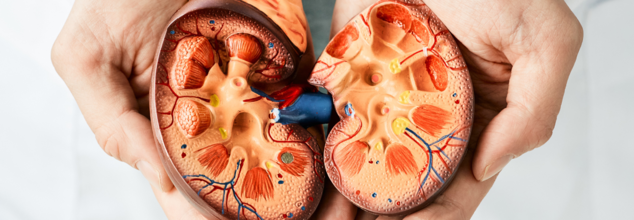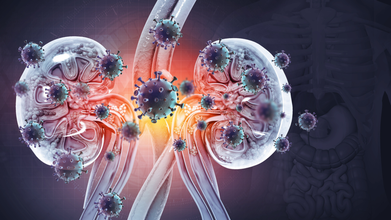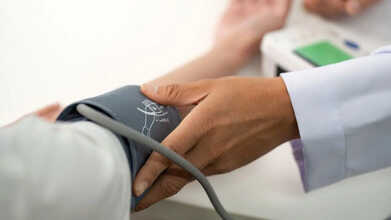- Health Conditions A-Z
- Health & Wellness
- Nutrition
- Fitness
- Health News
- Ayurveda
- Videos
- Medicine A-Z
- Parenting
India Ranks 4th In Kidney Cancer Cases, Why Is It Concerning?

Credits: Canva
Kidney cancer cases are rapidly increasing across the globe—and India has emerged as one of the top countries affected. The country currently ranks fourth in the world in terms of kidney cancer incidence, following China, the United States, and Russia. In 2025 alone, India reported 17,480 new cases, as per estimates by GLOBOCAN, a global cancer data agency.
What’s particularly concerning is that the disease is no longer confined to a specific demographic. Kidney cancer is now being diagnosed across all age groups, regardless of gender or lifestyle choices. Experts note that while urological cancers in general are seeing a rise, kidney cancer in particular is spreading at an alarming pace. This makes awareness and timely screening more critical than ever.
Know the Risk Factors
A range of lifestyle and environmental factors increase the risk of developing kidney cancer. Tobacco and alcohol use are among the most significant contributors. Obesity and high blood pressure—two conditions often linked with sedentary lifestyles—also play a major role.
Additionally, long-term exposure to certain chemicals such as asbestos, benzene, cadmium, and trichloroethylene can elevate the risk. People who work in industrial environments or in occupations with frequent chemical exposure should be especially cautious. Those with chronic kidney disease, patients on long-term dialysis, and individuals with a family history of kidney cancer are also more vulnerable.
Interestingly, the disease is significantly more common in developing nations, and the number of cases worldwide is expected to rise steeply by 2030.
Higher Prevalence in Men and the Aging Population
Statistically, men are affected by kidney cancer at nearly twice the rate of women, with a male-to-female ratio of 2:1. While the highest number of cases occurs in individuals over the age of 70, the trend is shifting. Increasingly, younger adults in their 30s and 40s are being diagnosed, likely due to changing lifestyle patterns and environmental exposure.
Symptoms That Should Not Be Ignored
Early detection of kidney cancer is often difficult because the disease rarely causes symptoms in its initial stages. However, certain signs—if persistent—should raise concern:
- Blood in the urine – Frequently mistaken for infection or dehydration.
- Constant pain in the flank area – On one or both sides of the lower back.
- Noticeable lump or swelling – In the lower back or side region.
- Unexplained fever – Triggered by substances released by the tumor.
- Appetite loss and sudden weight loss – Occurring without any lifestyle change.
- These symptoms can easily be overlooked or misattributed, which is why awareness is crucial.
The Importance of Early and Routine Screening
Most kidney cancers are discovered incidentally—often during ultrasounds or CT scans done for unrelated issues. When caught early, treatment outcomes can be significantly improved. Minimally invasive procedures such as laparoscopic or robotic partial nephrectomy allow surgeons to remove the tumor while preserving kidney function.
Technologies like intraoperative ultrasound (IOUS) help in real-time mapping of the tumor and surrounding blood vessels during surgery, enabling safer and more precise procedures. Robotic surgery adds another layer of precision with its 3D visualization and enhanced control.
In recent years, targeted therapies and immunotherapy have revolutionized the way advanced kidney cancer is treated, offering hope for improved survival and better quality of life.
Why Screenings Should Begin at 40
Although most kidney cancers appear between the ages of 50 and 70, cellular changes can begin much earlier. That’s why regular kidney health screenings are strongly advised starting at age 40. Annual imaging tests—particularly for those with a family history or other risk factors—can detect tumors at a stage when they are still small, localized, and easier to treat.
In the face of rising cases, timely detection and increased awareness are the most effective weapons in combating kidney cancer. With medical technologies and treatment options advancing rapidly, early diagnosis could make all the difference.
Is There A Link Between Your Kidney Health And Other Chronic Diseases? Lancet Study Says Yes

Credits: iStock
Turns out, kidney disease is not just a ‘kidney’ problem anymore, it can, in fact, affect other organs, and could even be linked to other chronic conditions, revealed a recent study.
In the US, more than 1 in 7 adults are affected by chronic kidney disease or (CKD). This means that 35.5 million Americans are affected by it, and what makes it worse is that 9 out of 10 people do not even know they have CKD, says the Centers for Disease Control and Prevention (CDC). Amid all these numbers thrown on to, something more concerning lies. A recent Lancet study shows a link between the rise in CKD and other chronic diseases. We are talking about chronic conditions like diabetes, high blood pressure, and obesity.
So, What Does The Study Say?
The researcher saw that 14 percent of adults who are over the age 20 or older, which makes 788 million Americans who had CKD in 2022. The biggest problem is not the disease itself, but the unawareness. Doctors, experts, and researchers from time and again have pointed out how kidney disease is often asymptomatic, this is why it is ignored until it becomes advanced. However, at that point the patients could already need dialysis or even an organ transplant. This gap in early diagnosis and treatment is what has made CKD the ninth leading reason of death, worldwide.
When you kidney functions naturally, it works as the powerhouse of filtration. A pair of healthy kidneys are able to filter and process more than 150 liters of fluid from the blood. These organs are also responsible for filtering out the waste and toxins through your urine. Not just that, but your kidneys also help in red blood cells production that keeps you healthy. When all of that does not happen, it can eventually impact every other organ in your body.
Like they say, everything is connected, and it surely is. For instance, somewhere around 20% of the blood that your heart pumps goes to your kidneys. If someone has diabetes and high blood pressure, it could damage the blood vessels and lead to protein in the urine and a slower filtration rate. It can then lead to other chronic infections, autoimmune disorders, and even genetic variants.
Kidney-Body Relation
If you leave your kidney disease untreated, it could lead to kidney failure. This is when you would be more in need of dialysis or a transplant. Doctors have pointed out that most people do not die of chronic kidney disease, rather it impacts their quality of life, worsening their cardiovascular conditions. It can lead to complications like a heart attack, a stroke, or a heart failure.
How Does This Happen?
People who have kidney diseases are at an increased risk for high blood pressure. Due to hurdles in the process of filtration, plaque build ups and hardens the arteries. This in return increases stress on the heart. In fact, the American Heart Association also defined the link between kidney and heart as 'cardiovascular-kidney metabolic syndrome'. This defines a health disorder that is a condition of the overlap of obesity, chronic kidney disease and cardiovascular diseases.
The bleed out of CKD is not just limited to your heart. The National Institute of Health, US points out that along with heart complications and high blood pressure, CKD could also lead to anemia, mineral and bone disorder, metabolic acidosis, malnutrition, and electrolyte imbalances in the blood.
So, What Is The Best Way To Keep Yourself Safe?
The first way is to note any symptoms and get yourself diagnosed. Look for signs like loss of appetite, unexplained nausea or vomiting. Do you feel tired often? Are you having trouble concentrating? Is there any change in how often you go pee?
Other symptoms like a change in your urine color or texture, or feeling itchy or dry, muscle cramps, unexplained weight loss or skin conditions could also signal towards kidney diseases.
However, not always does CKD show symptoms, experts suggest that to be one step ahead, it is important to undergo regular health checkups, including blood culture. General guidelines usually point towards getting a blood test done every 3 to 6 months. For someone with high blood pressure, diabetes or any other disease, the current guidelines say that those people should get regular blood and urine tests to screen for kidney disease. But what really happens is that though these tests exist, they are still used far too little. Doctors point out that many patients skip them because collecting a urine sample feels inconvenient, and overall awareness about kidney disease remains low. As a result, research shows that only about 35 percent of people with diabetes, and just 4 percent of those with high blood pressure, actually end up getting the recommended urine screening.
A ray of hope is that there are now several effective tools to slow the progression of kidney disease. Along with traditional options like ACE inhibitors, newer classes of medications including certain heart failure drugs and GLP-1 drugs. These medicines have shown to help protect kidney function. Although these newer treatments are not widely used yet, their adoption is steadily increasing.
What is important to remember is to also always consult your GP to ensure all preventative measures are followed carefully.
Does Drinking Cold Water Help With High Blood Pressure? Expert Reveals

Credits: Canva
Consuming enough water each day plays an important role in keeping the body working as it should. It helps digestion and metabolism, supports temperature control, aids waste removal, and keeps organs and tissues in good condition. Still, whenever blood pressure rises, many people look for quick fixes, and one of the most common questions is whether drinking cold water can calm the numbers.
The idea sounds straightforward, but the body reacts to cold in more layered ways. Knowing how cold water influences the heart and blood vessels can help separate fact from assumption. To understand this better, we spoke with Dr Rajeev Chowdry, Director of Internal Medicine at Yatharth Super Speciality Hospital, Sector 20, Faridabad.
Can Cold Water Help With Blood Pressure?
Cold water may bring down blood pressure for a brief period. Drinking chilled water can activate the vagus nerve in some individuals, which slows the heart rate and leads to a short-lived drop in blood pressure. The body also triggers a “diving reflex” when exposed to cold, such as splashing cold water on the face, and this can cause a similar short-term response.
Dr Rajeev explained, “Cold water may lower blood pressure for a small amount of time, but not enough to replace someone’s prescribed treatment for hypertension or to be trusted as a method to manage the condition.” He added that for certain people, cold exposure might have the opposite effect, causing blood vessels to tighten and raising blood pressure instead.
Blood Pressure: Who Is Most At Risk?
According to Dr Rajeev, some groups are more vulnerable to a rise in blood pressure, added strain on the heart, or other problems linked to sudden cold exposure:
- High Blood Pressure (Hypertension) — Cold temperatures narrow blood vessels, which can push blood pressure even higher and raise the risk of stroke or heart attack.
- Older Adults — With age, arteries become less flexible, making it harder for the body to adjust to sudden changes in temperature.
- People With Heart-related Health Issues — Cold exposure can place extra demand on the heart by raising blood pressure, changing heart rate in some cases, and reducing blood flow to the heart as blood vessels tighten. This may trigger chest pain for some individuals.
- Patients With Arrhythmias — Those with irregular heart rhythms may experience worsening symptoms, particularly with sudden contact with cold water.
- Individuals On BP-lowering Medication — Some may feel dizzy, lightheaded, or rarely faint if very cold conditions combine with medication that lowers blood pressure.
In summary, while water alone will not manage high blood pressure, staying well hydrated supports overall health and may contribute to better long-term blood pressure control. Anyone making changes to their routine should check with a healthcare professional, especially those already dealing with medical conditions or concerns about their blood pressure.
Is Your Skin Reacting to Toxic Air? Dermatologists Point to 8 Early Warning Signs

Credits: Canva
Air pollution is now recognised as a major trigger for skin problems. Dust, smoke residues, PM2.5 particles, and heavy metals settle on the skin through the day. They weaken the barrier, disturb the skin’s balance, and speed up signs of ageing. People living in crowded, high-traffic areas often notice dullness, pigmentation, breakouts, and sensitivity more than those in cleaner environments.
Two skin specialists helped us understand the early warning signs you should never overlook.
8 Signs Your Skin Is Reacting to Pollution
1. Sudden Dullness and Loss of Glow
Pollutants oxidise the skin’s natural lipids and damage its protective layer. This makes the face look tired and lifeless even when sleep and nutrition are well balanced. Many people notice a loss of glow on days spent outdoors, especially during peak pollution periods., as per Dr Geeta Grewal, Cosmetologist and Founder of 9Muses Wellness Clinic
2. More Blackheads and Clogged Pores
Dr Grewal notes that PM2.5 particles slip into pores and mix with sweat and sebum. This leads to blackheads, whiteheads, and congested skin. A rough, bumpy texture is one of the most common pollution-related concerns.
3. Frequent Breakouts
Rising pollution levels increase inflammation and oxidative stress, which disrupts the skin’s microbiome. These changes can bring tiny breakouts, fungal acne-like clusters, or painful pimples. Environmental irritants often act as hidden triggers, especially in urban areas.
4. Uneven Skin Tone and Pigmentation
Constant oxidative stress encourages the skin to produce more melanin. According to Dr Grewal, this results in dark spots, sun spots appearing sooner, and patchy pigmentation along the cheeks, nose, and forehead. Many people mistake this for sun damage alone, but pollution plays a major role.
5. Increased Sensitivity
If skincare products that once felt comfortable now sting or cause redness, pollution may be weakening your skin barrier. Warning signs include burning, itching, a warm sensation on the skin, or sudden irritation without a clear cause, as per Dr Ameesha Mahajan, Cosmetic Dermatologist and Founder, Eden Skin Clinic.
6. Early Fine Lines and Premature Ageing
Dr Mahajan explains that pollutants trigger free radical damage. This breaks down collagen and elastin, the proteins that keep skin firm and smooth. Over time, it leads to wrinkles, crow’s feet, and mild sagging around the eyes and mouth.
7. Dry, Rough, or Dehydrated Skin
Pollutants strip moisture and damage the barrier, causing tightness and flakiness even in people with oily skin. When the barrier is compromised, moisturisers stop working as well, which worsens dehydration.
8. Frequent Rashes or Dermatitis Flares
People with sensitive skin conditions such as eczema, psoriasis, or rosacea may notice more flare-ups when pollution rises. Dr Mahajan says that constant exposure can lead to rashes, bumps, and patchy irritation that keeps returning.
Avoiding pollution entirely is difficult, but protecting your skin is possible. Strengthen the barrier with antioxidants, sunscreen, gentle cleansers, and weekly detox habits. Watch for the early warning signs mentioned by the experts and act early. A strong skin barrier remains the most reliable way to maintain clear, healthy, and youthful skin despite rising pollution levels.
© 2024 Bennett, Coleman & Company Limited

